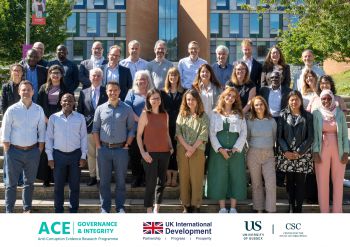GI ACE Mid-Term Conference brings together global experts to tackle corruption challenges
Posted on behalf of: GI ACE
Last updated: Thursday, 2 October 2025

The Governance & Integrity Anti-Corruption Evidence (GI ACE) Programme, funded by the UK Foreign, Commonwealth & Development Office (FCDO) and hosted at the University of Sussex's Centre for the Study of Corruption (CSC), convened its Mid-Term Conference on 8 and 9 September. The two-day event brought together more than 60 researchers, policymakers, and practitioners from the UK and beyond to share findings, strengthen networks, and chart the way forward in the global fight against corruption.
What is GI ACE?
GI ACE is a flagship global research programme that generates actionable evidence on corruption and integrity. With over 36 projects led by universities and institutions worldwide, the programme spans Africa, Asia, Latin America, and Europe, and has built a network of more than 100 researchers. Its mission is to develop practical insights that can inform governments, international organisations, and civil society actors as they design and implement anti-corruption reforms.
Since its transition to Sussex in early 2024, the GI ACE programme has expanded the Centre for the Study of Corruption's role as a global leader in high-impact research, combining rigorous academic inquiry with a strong focus on policy engagement and uptake. The programme's thematic areas include global finance and the enablers of corruption, crisis responses and vulnerable sectors, corruption risks in global trade, sectors and institutions, integrity systems, and, most recently, state capture.
The Mid-Term Conference
The Mid-Term Conference offered a platform for the research teams to present early-stage findings from across the GI ACE portfolio, with discussions on how to maximise their real-world policy impact. Panels addressed key issues such as:
- Global finance and the enablers of corruption, including money laundering, illicit trade, and the contested role of professional gatekeepers.
- State capture, exploring how institutions and civil society can build resilience against entrenched forms of corruption.
- Crisis responses and corruption in vulnerable sectors, with case studies from health, procurement, and climate transition finance.
- A high-level roundtable on the shifting global order, where leading experts reflected on the future of international cooperation on anti-corruption approaches.
Professor Elizabeth Dávid-Barrett, Director of CSC and Programme Director of GI ACE, said: "The Mid-Term Conference has been an invaluable opportunity to take stock of what we have achieved so far and to chart the way forward. It was inspiring to see such a diverse and committed group of researchers and practitioners coming together with a shared purpose: to generate evidence that not only advances knowledge but also delivers practical impact. The discussions and partnerships formed here will play a vital role in shaping the next phase of the programme."
Reinforcing Sussex's global role
The conference reaffirmed the University of Sussex's position as a global leader in anti-corruption research. By hosting the FCDO-funded GI ACE programme, the University demonstrates the strength of its Centre for the Study of Corruption in producing cutting-edge research, engaging with policymakers, and bridging the gap between academic inquiry and practical policy formulation and implementation.
Further information: https://giace.org/

